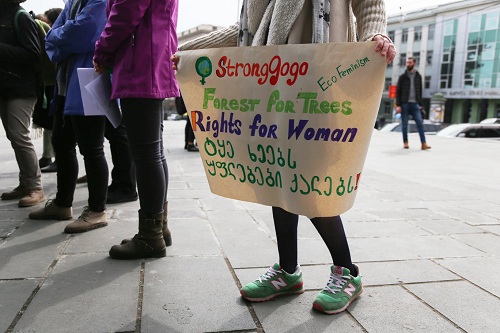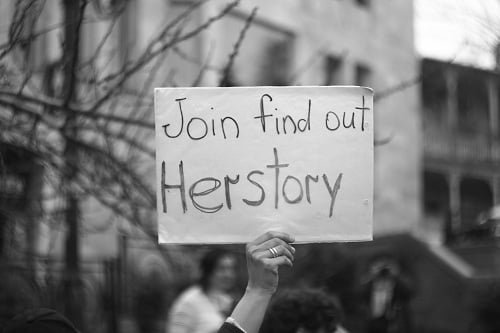Reclaiming Georgia’s Feminist Heritage
The sun and colors of early Tbilisi spring in the air, a colorful group gathers at the stairs of the Tbilisi State University on March 8 to mark the International Day of Solidarity of Women.
The march in central Tbilisi is organized by the Independent Group of Feminists (IGF), but many who attend, do not belong to the activist group itself. Slogans in Georgian and English read “Woman’s work is an invisible work,” “Forest for trees, rights for women,” “Destroy the Patriarchy, not the planet,” “It’s Herstory’s Time.”
A small crowd of 60, mostly women, rallies towards a glass-and-concrete doughnut of Tbilisi Concert Hall. A sight of them, whistling and shouting out slogans attracts the bystanders. Do their words resonate with people they cross in the street?
For Eka Imerlishvili, one of the IGF activists, this is one of the key worries. She feels the ideological rigidity and eclecticism of the feminist groups, “leads us to coming up with messages that are far from ordinary people’s lives.” And reclaiming the forgotten historical heritage is one of the ways they go about to make their message resonate.
The March Tells the Story
This is the “feminist tour,” a pilgrimage to Tbilisi’s spots marked by the feminist heritage, now largely forgotten. “These are histories of women that lived 100 years ago, that had progressive ideas about women’s rights and empowerment,” Tamar Dekanosidze tells journalists. “We need to make histories of these women come alive so that we know feminism is not an ideology forced upon us from abroad and the west, but rather ideology that had roots in Georgia.”
At the stairs of Tbilisi State University’s main building, activist of the Young Georgian Greens, an environmental movement, and an ardent IGF sympathizer Alla Parunova reads the scathing words by one of the first Georgian suffragists Nino Tkeshelashvili made in 1917 on the same spot the Georgian Social-Democratic party leaders gathered inside.
“I am no public speaker, our past, the women’s bound existence made us mute… but the injustice you have inflicted would make even a mute speak. Women care for the family, raise children, serve society which whatever means are available to her. Did not we have sufficient revolutionary women? And you could not choose one women among [your] twenty delegates? Is that your sense of justice?!”
At the second stop, Salome Zhvania, young feminist, emphasizes the progressive and diverse nature of the early Georgian feminism. Commenting on XIX-XX century socialist feminist writer Babilina Khositashvili’s letter defending female sexuality, Zhvania says “Georgian feminists regarded prostitution as a sign of patriarchy and as an attempt to subjugate women.”
For everyone at the rally, the Georgian history needs to be rediscovered. “Georgian writer and feminist Ekaterine Gabashvili [in early 20th century] opened a school in her house that changed lives of many women. That house was located near here,” says Ia Bakhtadze, IGF activist, in front of central Rustaveli Metro station. “Unfortunately, we are taught about Gabashvili, only as children’s writer and her feminist legacy is largely ignored, Bakhtadze says.
Another activist, Nukri Tabidze, who teaches a starters’ course on feminist ideas at the Tbilisi State University, recites the letter of Kato Mikeladze, Georgian feminist and women’s rights advocate. Prevented from making her speech at Tbilisi’s Moresque Opera and Ballet theatre where the first National Council – a precursor to the parliament – took place in 1917. She retorted: “neglecting and ignoring women’s rights represents the biggest misfortune for the mankind and the nation…We, the Georgian women are sure you will not bring this injustice to the national rebuilding of Georgia”.
The next stop is unplanned. Irakli Khvadagiani, an enthusiast of the Soviet era history of Georgia, asks the group to halt at the corner of former building of parliament, where an Orthodox Church once stood. “Maro Makashvili is also buried here, a woman who has become a symbol of the tragedy of the First Republic,” Khvadagiani says. Makashvili, young nurse whose personal diaries decry the subservient sort of women and aspire for a greater role in building her country found her final resting place here. She died alongside young military school cadets defending Tbilisi from the invading Soviet Army in 1921. Her and the soldiers’ graves, as well as the church were razed to make way to a Stalinist hall of the Supreme Soviet.
“And it is here, on the other side of the street five parliamentarian women worked in the first Georgian parliament,” Khvadagiani adds, emphasizing the progressiveness of the short-lived First Georgian Republic of 1918-1921, which gave women the right to vote and to be elected to office in 1918.
Carrying the Torch – Independent Feminists
Holding the megaphone for enthusiastic Khvadagiani is Eka Imerlishvili, whom I first got to listen to as an Independent Feminists’ Group activist at the Decolonization Perspectives Forum in Tbilisi. We talked to her in a hip Tbilisi café the following weekend.
Educated in Budapest’s freedom-loving Central European University (CEU), young political scientist is one of the 15 women representing “the independent feminists” that come from “different social backgrounds,” as Imerlishvili calls it. “Some of our members are privileged women that have good, well-paid jobs. Yet we also have other women who have not got these privileges. Some are from the provinces and yet others work in academia,” Imerlishvili tells me.
What makes the group stand out is that it refuses to officially register as an organization, taking pride in being “non-hierarchical, non-registered group.’’ It reacts to various emerging issues, rather than having a set out strategy.

Imerlishvili explains, that none of the original founders from 2011 are the members of it at the moment. “Though the group still exists,” she says with pride “because of this we think our ideological traits were right [from the outset] and [that] we have found the place that no other organization can fill.”
The groups’ original topics of choice in 2011 were hard-hitting and socially controversial. They rallied for LGBT rights, demanded sexual education in Georgian schools and expressed support towards abortion. This led to street scuffles and verbal abuse by conservatives. While still focusing on these matters, the topics of protest has gone way beyond the original agenda since.
“To us, feminism is not about women’s emancipation agenda only,” Imerlishvili explains. “It goes to include green issues, labor rights, LGBT community’s rights, prostitution issues, etc.”
Independent Feminists toured the mining towns in western Georgia, expressing solidarity to striking workers. They were at the Tbilisi State University in a sit-in, when students demanded higher autonomy and education reforms.
Imerlishvili stresses their independence. “By independence we mean having an independent agenda. At least on this stage, we mean independence from donors’ financing mechanisms,” she says. Imerlishvili is adamant the group does not endorse any particular vision of feminism, but sees it as an umbrella ideology.
What becomes increasingly clear in our conversation, is that the group sees as its key role to translate and interpret sophisticated NGO and academic feminist discourse into the one that would be easily understandable and accessible.
“Our group has an ambition to promote topics that might not be seem as relevant for local context, but we want to break taboos,” Imerlishvili tells us. “These are the issues of sexual freedom, autonomy of body, critique of the inevitability of motherhood. At least we want people to ask questions.” While gunning for constructing an authentic agenda of contestation, Imerlishvili agrees the women’s experiences are broadly similar and shared everywhere, be it in Georgia or the West.
Communication is on the activists minds: not only with ordinary public, but with other activist groups too.
“This group stands closest to my ideas,” Mariam Tchantchaleishvili, young researcher and gender studies graduate, tells me during the tour about the Independent Group of Feminists, expressing worries that the current Georgian feminist movement is too atomized, and that there is a lot of issues that Georgian women’s rights activists disagree about.
“Last year we tried to gather various [women’s rights] groups, but we could not achieve unanimity about what to define as our common topic for March 8,” Imerlishvili tells me with regret.
To what degree will Georgian feminists manage to be closer to ordinary people and come up with a unified strategy to struggle with patriarchy and oppression is hard to say. Clearly, they have a proud legacy to build on, albeit being overshadowed by 70 years of Soviet fake sycophancy to women’s issues. Will more bystanders join?
